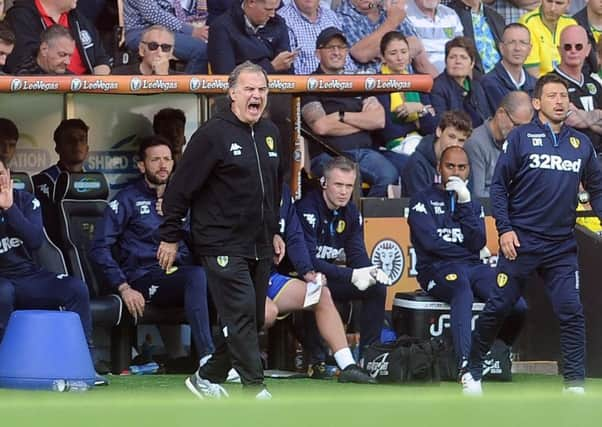Leeds United: Bielsa determined to stay true to '˜spirit of the game'


What Bielsa has come to realise quickly is that the Championship is disinclined to play into his hands or those of his players. It went without saying that the fundamentals of Bielsa-ball would provoke specific attempts to negate it but last weekend’s loss to Birmingham City was an example of the way in which the philosophy of Leeds United’s head coach will be examined and challenged.
Bielsa could not have asked for more possession on the day – 71 per cent and near-total dominance in the second half – but Birmingham’s deep positioning and the committal of men behind the ball, the ‘low block’ as football has taken to calling it, is a trend Bielsa has seen before and will see again, especially at Elland Road. His ideas depend on finding space and creating more of it, allowing the attacking talent in his team to sing.
Advertisement
Hide AdAdvertisement
Hide AdBoth Rotherham United and Middlesbrough adopted Birmingham’s mindset in Leeds last month, lying low and waiting for mistakes to leave Bielsa’s players prone. Rotherham were picked off but not before they had struck a post and missed a sitter from six yards and Boro contested a goalless draw while giving up 62 per cent of possession. Bielsa conceded at the end of Boro’s visit that Leeds’ stifled creativity had deserved no more than a point.
It is in these scenarios where the Argentinian’s wit and the ingenuity of his squad will be most crucial but Bielsa’s feeling after full-time on Saturday – in spite of the errors against Birmingham, in spite of his own misjudgements and in spite of the final score – was that his insistence on trying to play openly was more in tune with the “spirit of the game”. “My position,” he said, “is trying to reach the beauty of the game.”
Bielsa came to Elland Road with a promise of the football which coaches in the modern era aspire to and to make his point at yesterday’s press conference, he asked a question: would people prefer to see Leeds go at Birmingham as they did no matter the result or would they prefer Leeds to take a defensive mindset and play for a draw? There is, evidently, a third way where his side wear Birmingham down and win the game but the question still stood. And deep down Bielsa knows how most in Leeds would answer.
“You have two paths,” he said. “Either you risk playing and make a mistake because when you play it’s implicit that you can make a mistake. Or the other path is that you don’t play, which is a possibility too. But imagine a game where both teams don’t want to play.
Advertisement
Hide AdAdvertisement
Hide Ad“This is among the rules. The rules allow you to do that but it’s not the spirit of the game. I assume my position regarding this problem. My position is to try to reach the beauty of the game and it’s a lot more difficult to reach the beauty when only one team wants to play.


“Reducing spaces and not playing – if you do this, the rules allow you and I’m not complaining about that. I’m just talking about the difficulties we faced. The fans who are the centre of our activity are obviously in love with results but we should ask ourselves if the fans are ready to put the game as a priority.
“We could ask, for example, to the fans of Leeds what they would have preferred: us to lose as we lost by trying to overcome the opponent, even if we couldn’t play well. Or to draw the game without playing. Because if we hadn’t played, we could have got a point.”
Birmingham’s approach was only a blueprint insofar as the mistakes made by Bielsa’s players – off the scale in terms of the number of times they conceded the ball before half-time – helped it to work. Bielsa admitted that a shortage of room to work with around Birmingham’s box had sucked his players closer together, making them easier to mark and contain.
Advertisement
Hide AdAdvertisement
Hide Ad“It’s not about daring to do something,” he said. “If you don’t dare, you just stop playing. If you don’t make passes the only thing you have is to play long balls and give the ball back to the opponent.
“What you’re talking about is the system of playing against small spaces. We have many teams in the Championship who play like that. Half of the games so far have had these features. I honestly think we have all the ingredients to play against these teams.
“When you have many bodies in a small space the trend is come close and ask for the ball but it’s the worst thing you can do because these spaces become even smaller. This is the difficulty created by the opponent.
“We know what we have to do to solve this kind of problem. The first step is knowing what to do, the second is doing it and the third is doing it well. But you have to imagine what would happen if both teams played the same way. What kind of spectacle would you have?”
Advertisement
Hide AdAdvertisement
Hide AdBirmingham were without a league win before Saturday, a club in need of a result any which way. Wednesday’s form is better and good enough to place them four points off the top of the league, in a glut of clubs on Leeds’ tail. Jos Luhukay, their Dutch coach, will take heed of prior performances under Bielsa but United’s boss could find that Wednesday are far more willing to trade punches in open play.
Bielsa was adamant again in blaming himself for the end of Leeds’ unbeaten start in the Championship last weekend. He also railed against the idea that in criticising his own tactics against Birmingham he was protecting players who might themselves have been due scrutiny for their performances.
“I gave some strong arguments to explain why I was responsible,” Bielsa said. “I don’t deserve to be asked this and I’m going to explain why.
“When a head coach says he’s responsible and doesn’t give arguments, what he’s saying is that the real responsibility lies with the players. If you don’t explain why, the people who listen to say it’s not the head coach, it’s the players’ fault. I reject this kind of practise.
Advertisement
Hide AdAdvertisement
Hide Ad“I gave arguments for why I was responsible. I don’t know if the arguments are right or wrong but they are solid. I never say something if I cannot give arguments for it because people would suspect me.
“When I say something, I’m saying what I think. I don’t say what’s good to say. You cannot be a leader if you don’t assume responsibility publicly. You can’t be a leader if you say the responsibility is the team’s.”